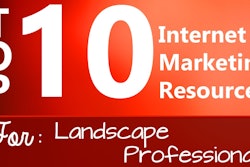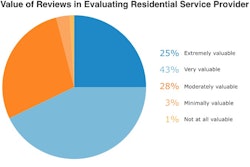Many Green Industry businesses have come to understand the importance of not only a nice company website and professional online presence, but also their representation on the major search engines of Google, Yahoo and Bing. Through Search Engine Optimization (SEO), business owners have been able to gain visibility on organic search results by enhancing their website content with photos, tips, blogs and videos. But once these changes to your website have been made, what’s next?
The important thing to remember about SEO is that its success is not guaranteed. While it may be very cost effective, the fierce competition makes prime search result placement a challenge. The only way to ensure that your business website appears in a preferred location on these outlets is to incorporate Search Engine Marketing (SEM) into the business strategy.
SEM allows businesses to prominently position their business details and URL in a “sponsored” location on search engine results. Accounting for nearly 75% of all search traffic in February 2013 (Experian), Google has proven to be the channel to receive the biggest SEM benefit. Therefore, understanding the process of creating a Google AdWords campaign is of great benefit for all small- to medium-sized businesses.
Competitive research
To begin, conduct some research of your own. Look into what your main competitors are doing in terms of online marketing and which promotions they are highlighting. Analyzing what techniques are being focused on in the industry will help mold the campaign.
Customer research
Consider your audience. Many web hosting companies offer analytics tools for users to evaluate the elements of their site. Data like where visitors are coming from, when they are visiting, and which pages are most popular can all be of great use for SEM. Use this existing feature to determine what time of day and which days of the week you should have your campaign live. Additionally, this will identify which areas (or pages) of your website your target audience is most interested in. If your lawn care page proves to be the most popular, you might want to make it the main focus in the advertisement.
Keywords
Keywords, or terms and phrases specific to your business, should be strategically decided upon. Think about what your customers search in Google to find a business like yours. If it is a service, your location, or a specialty, be sure to incorporate these terms into the ad text. Though more industry jargon may seem to be more relevant in searches to you, your target audience may not be as well educated in the landscaping field. Therefore, they are more apt to use simpler terminology when searching. Your website’s statistic reports can also help you identify which terms people are using to find your business.
Bidding
Once the keyword search terms are established, you will need to “bid” for their use. Some keywords have a high demand which may require you to make a greater investment. Luckily, smaller businesses are not highly subject to this so landscaping professionals should expect to spend between $0.80 and $1.25 for a keyword depending on its popularity. While you may appear as a “sponsored” result multiple times, you will only be charged the amount you bid when someone clicks on the link used in the ad.
Experts can help
The concept of AdWords can be rather complicated. Consider working with a third party to help execute the campaign. Especially if you are a beginner, the process is not only complicated, but very strategic and time consuming. As a small business owner, you may have other priorities that consume these resources. An external partner will not only give you a great amount of expertise, but can also steer you in the right direction while you can focus on the operations of your business.
Evaluate and tweak as necessary
As the official medium for advertising on the search engine power player, Google AdWords is perhaps the most measurable marketing method. When committing to strategies that require monetary investments, being able to ensure a good return on investment is crucial. Statistical research is a sure way to achieve this.
As mentioned earlier, using your website statistics will help you start the campaign, but AdWords’ very detailed reporting system can assist you in evaluating it after launch. For example, the data may show that most visitors are coming from Chesterbrook, PA. If you don’t want to serve that market, you may want to tailor your reach to specific location so money is not wasted on an irrelevant audience.
The first month of the campaign should be focused on driving as much traffic as possible to the promoted website. After the first month, use the analytic tool to evaluate what ads are working and which are not. Though you should review the data every month, you should only make changes after three months. This allows you to make proper comparisons for correct decisions.
Proven to offer businesses great ROI, Google AdWords has become one of the most popular forms of marketing and well worth the investment. With the ability to guarantee ideal placements on the search engine giant, your landscaping business has the potential to increase credibility and reputation, not to mention profits.
Key considerations when determining a Google AdWords budget
Where are your current website visitors coming from?
What terms are customers using to find your business?
How geographically large is your target?
How popular are your ideal keywords?
How many visitors do you wish to attract each month?
Useful Terms
SEM (Search Engine Marketing): Process of marketing your website and gaining traffic through paid advertisements on search engines.
SEO (Search Engine Optimization): Process of utilizing keywords and enhancing their online presence to increase ranking of organic search results.
Keywords: Important terms or phrases specific to your business and industry.
Google Quality Score: A rating of value determined by a number of factors including the relevancy of your advertisement and landing page as well as popularity, to name a few.
PPC (pay-per-click): An internet advertising method in which the advertiser pays a search engine only when their ad has been clicked.
CTR (click-through rate): Measured by taking the number of clicks received divided by the number of impressions generated. Most small to medium-sized businesses should strive for a 1-5% CTR.
Impressions: The exact number of times a website has been accessed or viewed by a user.
Kelly Meeneghan is a public relations manager at 1&1 Internet, a global web hosting provider offering small businesses a one-stop-shop for getting online, from private domain registration and email to websites and eCommerce tools. Visit 1and1.com for more information.



















